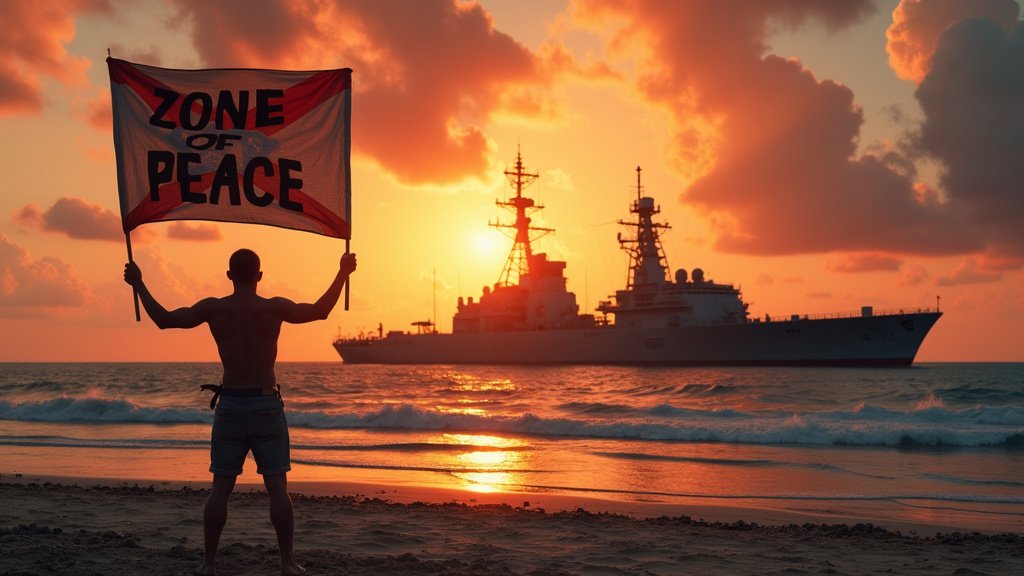The Caribbean, a region long striving to uphold its designation as a “Zone of Peace,” finds itself at a critical juncture as the United States, under the Trump administration, has intensified military operations and launched a series of deadly airstrikes against alleged drug-trafficking vessels. This aggressive posture has ignited a groundswell of resistance across the islands, with citizens, civil society groups, and even some governments demanding a return to diplomacy and a steadfast defense of regional sovereignty.
Escalating US Military Operations Stir Regional Unease
Beginning in September 2025, the Trump administration initiated a campaign of lethal airstrikes in the Caribbean, targeting vessels suspected of narcotics trafficking. President Donald Trump publicly announced these actions, often characterizing the targets as “narco-terrorists” and affiliated with designated terrorist organizations. Reports indicate that at least six such strikes occurred between September and October, resulting in the deaths of over 30 individuals. Despite these claims, concrete evidence substantiating the presence of drugs or weapons on the targeted vessels has frequently been absent, leading to widespread questions about the legality and justification of these operations.
These military actions have been accompanied by a significant US naval buildup in the southern Caribbean, deploying multiple warships, submarines, and thousands of personnel. This deployment, ostensibly aimed at combating drug cartels, has heightened tensions, particularly with Venezuela, which has viewed the US military presence as a direct threat to its sovereignty. The legality of these strikes and the administration’s framing of the operations as a “non-international armed conflict” have been challenged by legal experts and some US lawmakers, who cite a lack of due process and congressional authorization.
The Caribbean’s ‘Zone of Peace’ Principle Under Threat
The Caribbean Community (CARICOM) and the Community of Latin American and Caribbean States (CELAC) formally declared the region a “Zone of Peace” in 2014. This declaration signifies a collective commitment to peaceful dispute resolution, respect for sovereignty, and the rejection of foreign military intervention and bases. The recent US military actions are viewed by many in the region as a direct assault on this fundamental principle, threatening to draw the Caribbean into geopolitical conflicts not of its making, echoing historical patterns of external powers imposing their will upon the islands.
Voices of Resistance: Peoples and Governments Seek Sovereign Peace
Across the Caribbean, a powerful wave of dissent is rising. Emerging political movements, such as the Left Alliance for National Democracy and Socialism (LANDS) in Jamaica, have been vocal in their condemnation. LANDS has demanded that CARICOM take a firm stand against regional militarization, urging leaders to prioritize the well-being of their people and warning against the historical damages of Western interventions. The People’s National Party (PNP) in Jamaica has also called for a unified regional response to the US strikes, emphasizing that the region’s waters should not become a “theatre of war”.
CARICOM foreign ministers have expressed unease and are seeking assurances from the US for advance notice of military operations that could impact the region. However, the bloc itself shows signs of division, with some member states, like Trinidad and Tobago, offering support for the US actions, while others advocate for a more cautious and independent stance.
Region-wide, a “Day of Action in Defense of the Caribbean” was organized, with protests and rallies held on over 15 islands. Activists and citizens are calling for the withdrawal of US military forces and reaffirming the region’s commitment to peace. This growing popular resistance underscores a collective desire for autonomy and a rejection of external military dominance.
Legal and Diplomatic Ramifications
The handling of survivors from the strikes has further amplified concerns. In several instances, survivors were repatriated to their home countries of Ecuador and Colombia rather than being detained or prosecuted by the US. This decision highlighted the administration’s struggle to legally justify holding suspects captured in what many view as essentially a law enforcement operation, raising questions about the very framework under which these military actions are being conducted.
The news that President Trump had also authorized covert CIA operations in Venezuela has added another layer of geopolitical complexity, fueling speculation about potential regime change objectives beyond counter-narcotics efforts. Diplomatic fallout has been evident, with Venezuela formally requesting UN intervention and questioning the legality of the US strikes under international law.
Conclusion: A Call for Regional Sovereignty
The recent events highlight a critical tension: the US administration’s assertive military campaign versus the Caribbean’s deeply held aspiration for peace, sovereignty, and self-determination. As the region grapples with these escalating militarized actions, the call for unity, diplomatic engagement, and a reinforcement of the “Zone of Peace” principle grows louder. The peoples of the Caribbean are demonstrating a clear resolve to defend their right to chart their own destiny, free from external coercion and the looming shadow of conflict, making this a pivotal moment in the region’s ongoing struggle for genuine autonomy. The unfolding headline stories from this region underscore the urgent need for global powers to respect the Caribbean’s commitment to peace and its right to exist free from foreign military imposition.

